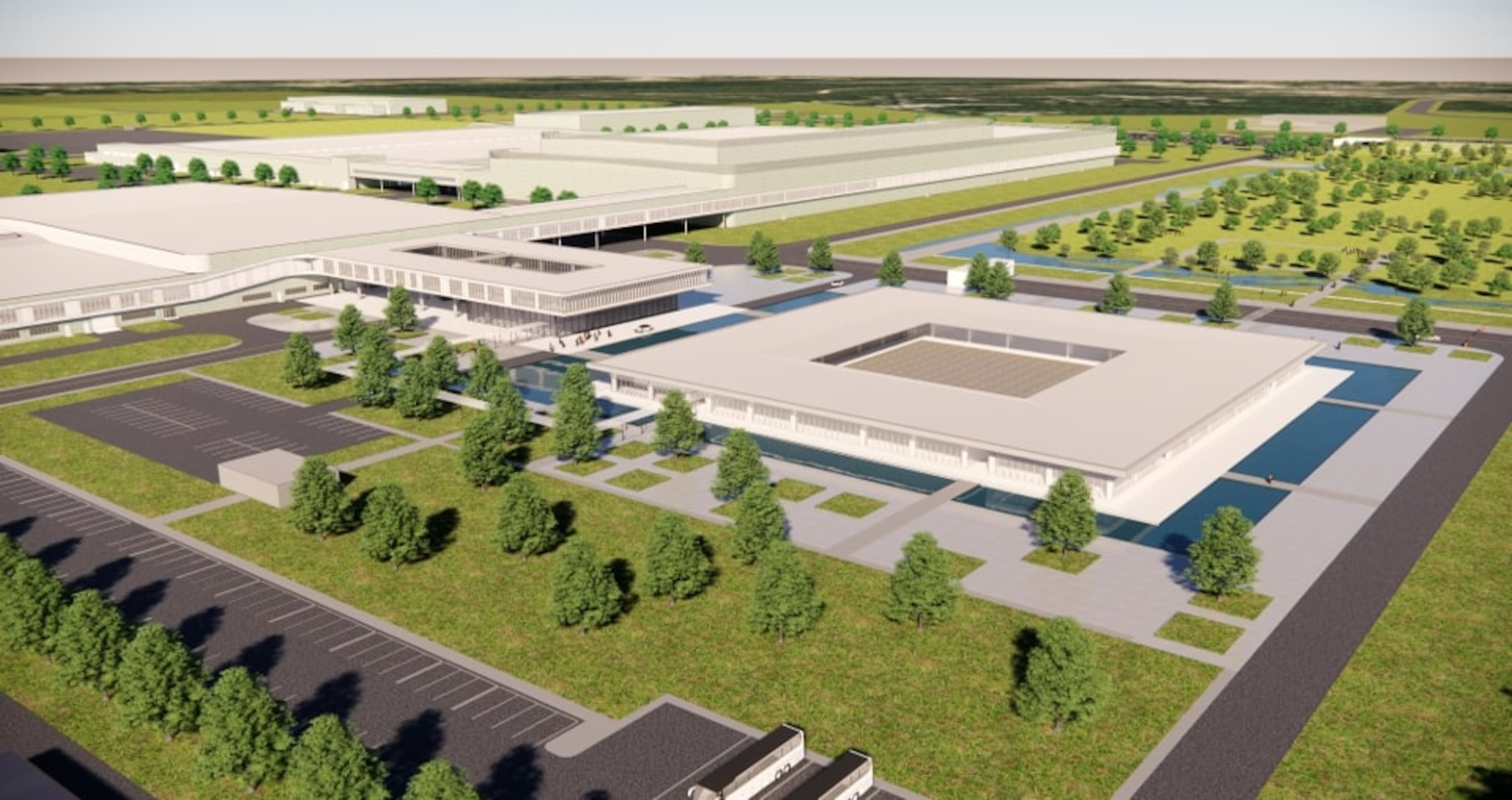First look: What Hyundai’s $7.6B EV Metaplant will look like
ELLABELL ― When Hyundai Motor Group broke ground on the site of its $7.6 billion electric vehicle and battery plant near Savannah one year ago, the 2,906-acre expanse resembled a moonscape, with few signs of the hulking factory destined for the site.
Today, steel frames form most of the plant’s major buildings. Roof and wall work have begun, and the 2,000-worker construction site is a hive of activity.
To celebrate the one-year anniversary of the groundbreaking, the Korean automaker offered the media and local officials a glimpse of construction progress on what it calls a “Metaplant.” The event included the unveiling of renderings of its EV factory, which is envisioned as something more akin to a Silicon Valley tech company campus than to the bleak industrial sites of other factories.

They also explained how the manufacturing process will blend artificial intelligence, robotics and human labor for a “smart factory” — putting the meta into a “Metaplant.”
The facility’s CEO, Oscar Kwon, affirmed the plant opening timeline. Production is to begin in early 2025. In recent months, Hyundai officials have said the project is ahead of that schedule and could open as early as October 2024.

Foundation work for the Bryan County campus’ many buildings are 99.9% complete and steel work is 81%, according to Hyundai. The automaker has already hired 290 of the estimated 8,500-member workforce, including 11 recent graduates of a newly created electric vehicle manufacturing program at Savannah Technical College.
Local economic development officials cheered Hyundai’s progress.

“We said when we signed the deal we felt like we’d won the Super Bowl,” said Trip Tollision, head of the Savannah Economic Development Authority and a member of the Savannah Joint Development Authority that owns the Hyundai site. “We feel now like we’ve won 10 Super Bowls.”
As part of recruiting Hyundai, state and local officials provided $1.8 billion in incentives, including tax breaks, grants and worker training, the largest such incentive package in state history. Suppliers to Hyundai so far have made commitments for 5,976 jobs and an additional $2.2 billion in new investments, Hyundai officials said.
A modern twist
Hyundai officials also shed light on some of the Metaplant’s distinctive features.
The facility will feature a glass-encased conveyor belt “bridge” to transport vehicles from the factory’s paint shop over to final assembly. Jumbo Park, the plant’s head of engineering, said the elevated and lit passage will be visible from Interstate 16.
One of the campus’ parking lots will feature a solar-panel canopy, which Park said will provide 5% of the factory’s electricity. The rest will be obtained through power purchase agreements, with the goal of sourcing 100% of the facility’s electricity from renewable sources.
Visitors to the plant will be able to explore a greenspace at the front of the facility abutting the interstate, which officials said will be larger than Savannah’s iconic Forsyth Park, which spans more than 30 acres. The goal, Park said, is to “connect the community with the people who work in the plant.”

For employees, on-site amenities will include restaurants, stores, a fitness center and health clinics, Hyundai officials said.
Metaplant workers are known in Hyundai lingo as “Meta Pros.” And the factory “will transform the definition of what an automotive plant is and will transcend its Meta Pros’ perception of what working in a manufacturing can be,” according to a presentation delivered to media members.
The Metaplant concept “speaks to” the automaker’s “brand pillars – sustainable, innovative and humane,” a slide in the presentation read.
Hyundai has yet to announce which models will be produced in Bryan County, but officials have said they plan to manufacture cars for all three of the automaker’s brands: Hyundai, Kia and Genesis. Output is expected to be 300,000 EVs a year in its first phase. The site will also produce batteries in a joint venture with LG Energy Solution.
Building such a range of cars in the same facility and presumably on the same assembly lines is a departure from traditional automobile manufacturing techniques, said Tollison.
Tax credits add urgency
One of the main reasons Hyundai is racing to open its Metaplant is so that the company — and its customers— can begin capitalizing on new federal tax credits for EVs manufactured in the U.S.
Getting more EVs on American roads is central to President Joe Biden’s plans to rein in global warming. To encourage more drivers to ditch their gas-powered cars for EVs, Biden’s signature climate and energy legislation — the Inflation Reduction Act — offers $7,500 tax credits for customers that buy EVs made in North America.
Hyundai, Kia and Genesis-branded EVs built overseas qualified for the previous generation of federal EV tax credits, but the new law means its vehicles are no longer eligible.
Hyundai officials, including its president and COO Jose Munõz, have criticized the law’s domestic production requirements, claiming they put the company at a competitive disadvantage. The company had already committed to building its Metaplant stateside before the legislation was adopted along party lines.
On Wednesday, Hyundai officials did not discuss the friction over the tax credits, but Kwon, the plant’s CEO, was clear the company wants to move as swiftly as possible to begin producing EVs in Georgia. Kwon said EVs are not expected to begin rolling off the Metaplant’s assembly lines until early 2025, but joked that Munõz, his boss, always likes to add “if not sooner.”




